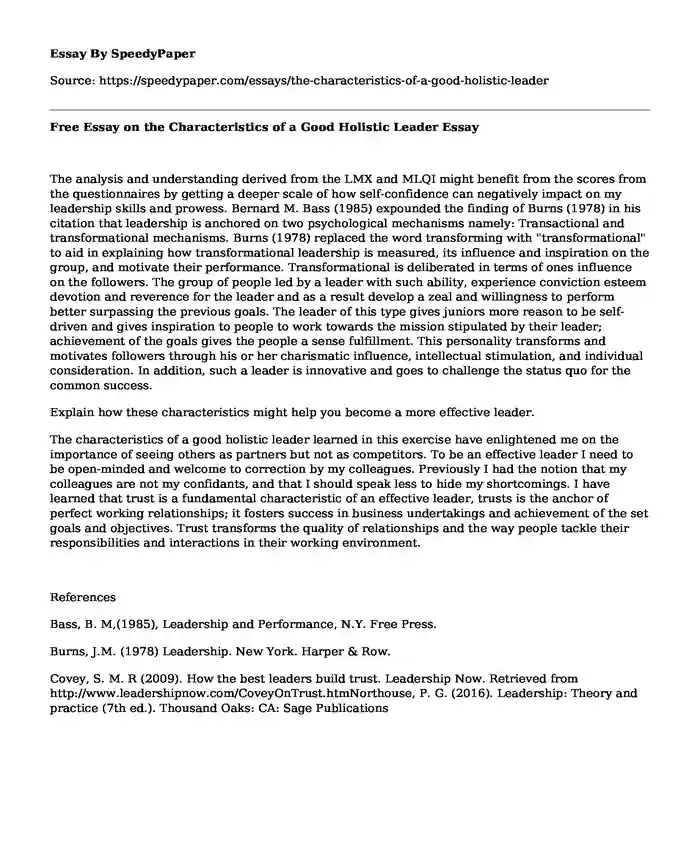
| Type of paper: | Essay |
| Categories: | Leadership analysis |
| Pages: | 2 |
| Wordcount: | 390 words |
The analysis and understanding derived from the LMX and MLQI might benefit from the scores from the questionnaires by getting a deeper scale of how self-confidence can negatively impact on my leadership skills and prowess. Bernard M. Bass (1985) expounded the finding of Burns (1978) in his citation that leadership is anchored on two psychological mechanisms namely: Transactional and transformational mechanisms. Burns (1978) replaced the word transforming with "transformational" to aid in explaining how transformational leadership is measured, its influence and inspiration on the group, and motivate their performance. Transformational is deliberated in terms of ones influence on the followers. The group of people led by a leader with such ability, experience conviction esteem devotion and reverence for the leader and as a result develop a zeal and willingness to perform better surpassing the previous goals. The leader of this type gives juniors more reason to be self-driven and gives inspiration to people to work towards the mission stipulated by their leader; achievement of the goals gives the people a sense fulfillment. This personality transforms and motivates followers through his or her charismatic influence, intellectual stimulation, and individual consideration. In addition, such a leader is innovative and goes to challenge the status quo for the common success.
Explain how these characteristics might help you become a more effective leader.
The characteristics of a good holistic leader learned in this exercise have enlightened me on the importance of seeing others as partners but not as competitors. To be an effective leader I need to be open-minded and welcome to correction by my colleagues. Previously I had the notion that my colleagues are not my confidants, and that I should speak less to hide my shortcomings. I have learned that trust is a fundamental characteristic of an effective leader, trusts is the anchor of perfect working relationships; it fosters success in business undertakings and achievement of the set goals and objectives. Trust transforms the quality of relationships and the way people tackle their responsibilities and interactions in their working environment.
References
Bass, B. M,(1985), Leadership and Performance, N.Y. Free Press.
Burns, J.M. (1978) Leadership. New York. Harper & Row.
Covey, S. M. R (2009). How the best leaders build trust. Leadership Now. Retrieved from http://www.leadershipnow.com/CoveyOnTrust.htmNorthouse, P. G. (2016). Leadership: Theory and practice (7th ed.). Thousand Oaks: CA: Sage Publications
Cite this page
Free Essay on the Characteristics of a Good Holistic Leader. (2019, Oct 31). Retrieved from https://speedypaper.com/essays/the-characteristics-of-a-good-holistic-leader
Request Removal
If you are the original author of this essay and no longer wish to have it published on the SpeedyPaper website, please click below to request its removal:
- Free Essay Sample on Positive Effects of Managed Care
- Free Essay Containing Psychological Analysis of The Other Sisters Movie
- Myers-Briggs Personality Essay Sample
- Violence in the Workplace: Annotated Bibliography Example
- Essay Sample on the Plight of the Jews
- Free Essay Example: Obesity Among the Children
- Essay Sample on Type 2 Diabetes
Popular categories




